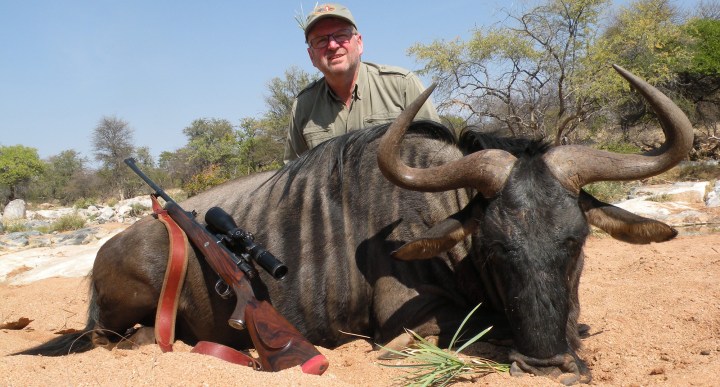HUNTING OP-ED
Can a global conservation fund bridge the gap between global finance and the realities for indigenous communities?

We asked community representatives from southern African countries what they thought of Dr Tamar Ron’s plan, first published in Daily Maverick, to replace hunting revenue with a global conservation fund.
The UK government’s proposed legislation to ban the importation of animal parts (or “trophies”) obtained from hunting safaris in other parts of the world has stirred up public debate.
In her opinion piece in Daily Maverick, “Hunting trophy ban must be backed by a global fund to support communities living with wildlife” (31 January 2022) Dr Tamar Ron proposes that hunting and wildlife trade bans should be supported by increased financial support for conservation, aimed specifically at rural communities who live with wildlife.
Her idea of a “global responsibility fund” is premised on the UK government (and others) being willing to replace the income generated from the sustainable use of wildlife with international aid. Unfortunately, this suggestion comes just a few months after the UK announced major cuts to its foreign aid budget, with African nations and climate-related financing set to receive less funding than in previous years. From a UK policy point of view, it seems highly unlikely that anti-hunting legislation will come with any form of significant funding.
It is nonetheless refreshing to see Dr Ron suggest that anti-hunting legislation come with funding, since most anti-hunting organisations and individuals ignore the negative consequences of this action. If the proposed bill came with extra taxes on the British public to support conservation in every country it would affect, it might meet the same resistance as the UK’s green agenda for climate change.
Further, the proposed legislation seeks to restrict hunting everywhere except in the UK. Anti-hunting lobby groups have unashamedly suggested that this legislation would be an “easy win” that need not have any negative consequences for the UK. Dr Ron’s views are therefore more laudable than many others who want to ban hunting.
Aside from whether or not the fund will materialise in the context of current UK politics, there are several key concerns with the proposal that merit a response. Since Dr Ron called for a dialogue with rural communities to find out what kind of funding they would like to see and how such a fund would work, we asked some community representatives from southern African countries what they thought of the plan.
These representatives have experience with various funding models of conservation, including multilateral aid and sustainable use, along with a thorough understanding of the needs in their respective countries and rural communities.
All of the representatives quoted in this article are members of the Community Leaders Network of Southern Africa, an association of community representatives from Angola, Botswana, Malawi, Mozambique, Namibia, South Africa, Tanzania, Zambia and Zimbabwe.
Hypothetically speaking, if a fund of this nature were set up, it could provide some much-needed assistance to rural communities — especially those that suffer from human-wildlife conflict, yet do not generate any income from wildlife-based industries (e.g. photographic and hunting tourism).
For his part, Malidadi Langa from Malawi “would love to see a fund that focuses on conservation, compensates for human-wildlife conflict, and supports the livelihoods of local communities.” With a high human population density and a recovering wildlife population, hunting is not currently a viable option in Malawi.
Yet even in Botswana, where several communities currently benefit from hunting, Satau Gakemotho points out: “Not all communities are in the wildlife economy value chain, yet they are adversely impacted by human-wildlife conflict.” He continues, “we need funding for meaningful and effective conflict mitigation measures, because increasing wildlife populations are endangering human lives.”
There is clearly a need to plug funding gaps where market-dependent wildlife industries do not generate enough income. Indeed, the needs have increased dramatically in recent years due to the impact of Covid-19 on international travel.
The concept of a global fund was met with some scepticism, however, among those who had experience with similar funding mechanisms. The Green Climate Fund is one such mechanism that is meant to funnel money from developed countries that have caused the climate crisis to developing countries that are bearing the brunt of climate change.
While this is an important initiative, the conditions for accessing this fund are onerous, as Chifundo Dilaleni reflects on Malawi’s experience: “We started the application in February 2018 for $5-million, but until today no funds have been disbursed.”
Joseph Kanyetu of Namibia expressed similar reservations about global funding reaching local communities: “At the end of the day those who are supposed to benefit from these funds get zero.”
Rather than start at the global level and invite people to apply for funding, one could start in places where help is most desperately needed and then scale the concept to a continental level. While philanthropic organisations such as African Parks and the Peace Parks Foundation have stepped in to assist governments with managing state protected areas, much more could be done in areas where people live alongside wildlife.
Critically, this funding should be easy to access for rural people and align closely with their needs. Producing a working model based on locally grounded solutions to challenges faced by rural communities would overcome some of the reservations expressed here.
The gap between global finance and local realities is a technical issue that might be solvable if the proposed new fund operated in an entirely different way to the current examples. Yet the community representatives highlighted a fundamental problem with this proposal that defies technical fixes. This problem goes to the heart of many dealings between the Global North and Global South, and revolves around two closely related issues — dependency and rights.
Elsewhere, these community representatives and others have called for a change in how communities are involved in the use and management of their natural resources. Rather than being mere “stakeholders” they want to become shareholders, whereby they have greater roles and responsibilities in the management of their natural resources.
To this end, they ask that governments (both their own and others) grant and respect their rights to use their resources sustainably. In a significant step in this direction, the African Commission on Human and People’s Rights called on African States to recognise and support these rights in a recent resolution.
On the ground, community members should be trained to take on managerial roles that are currently dominated by outsiders, while community organisations should be able to market their products directly to international visitors without the “middlemen” (e.g. hunting outfitters or tourism companies). Following this pathway would mean communities having a greater share in the income generated by these activities and more control over the management of their natural resources and their relations with international visitors.
Yet the proposed global fund is contingent on communities giving up their rights to use and trade their wildlife on international markets. Rather than moving from stakeholders to shareholders, communities that currently generate income from hunting would become beggars who depend on international generosity.
In the words of Maxi Louis from Namibia, “creating dependency is going backwards, and very patronising.” Liberty Chauke of Zimbabwe neatly summed up this position: “This is a huge trap to hoodwink us from our conservation practices. We need to be careful and focused. That funding is not going to last forever. We just need to subscribe to the principles of sustainable utilisation of our wildlife. It is in light of this position that through sustainable utilisation of our natural resources we can self fund our conservation activities, thereby reducing dependencies.”
Even if the UK and other developed countries massively increased their funding for conservation, these community representatives argued that funding should not come with strings attached that force them to relinquish their rights.
“While we would appreciate any thoughtful financial aid to support conservation management and rural livelihoods, the sovereignty of African nations must still be appreciated and respected,” Dr Rodgers Lubilo from Zambia explains. “We don’t want to further perpetuate external dependence, we have come of age, and we need to do things for ourselves. So yes, establish this fund, but with no conditions regarding hunting. We will develop African-driven actions to ensure that hunting benefits people.”
International governments can either hinder or help African conservation with their policies and funding mechanisms. A blanket ban that restricts the legal, sustainable use of wildlife would be a hindrance. By contrast, policies and funding that assist community-based organisations to become true shareholders in wildlife-based enterprises would be highly appreciated.
In this way, greater benefits could be generated for rural people who conserve their local environment, thus linking a greener future with a brighter future. DM
Leslé Jansen is the CEO of Resource Africa South Africa (RASA) and Gail Thomson is a conservation communications specialist working with RASA. They work closely with the Community Leaders Network of Southern Africa, an association of community representatives from Angola, Botswana, Malawi, Mozambique, Namibia, South Africa, Tanzania, Zambia and Zimbabwe. All of the representatives quoted in this article are members of this association.
[hearken id=”daily-maverick/9193″]




















 Become an Insider
Become an Insider
Comments - Please login in order to comment.